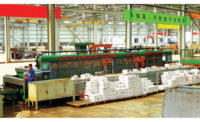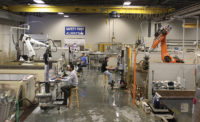Late in 2018, the U.S. Trade Representative released a list of approximately $200 billion worth of Chinese imports that will be subject to additional tariffs. Starting in September of last year, the tariffs were set for 10%, on top of other antidumping and countervailing duties, and in the New Year will be increased to 25%.
On top of that, The Department of Commerce announced its affirmative preliminary determination in the antidumping duty investigation of imports of quartz surface products from China. The assigned preliminary dumping margins of 242.10%, 341.2% and 289.62% to mandatory respondents, C Q International Limited, Foshan Yixin Stone Co., Ltd. and Guangzhou Hercules Quartz Stone Products Co., Ltd., respectively. The Department of Commerce determined a preliminary dumping margin of 341.29% for the China-wide entity, based entirely on adverse facts available. The Department of Commerce preliminarily determined a dumping margin of 290.86% for all other exporters from China that The Department of Commerce found to be eligible for a spate rate. The Department of Commerce will announce its final determination on or about April 4, 2019.
Back in September, we talked with Rupesh Shah of MSI about how he and his company plan on moving forward from the preliminary ruling in September. “We are going to fight Cambria’s claims at the International Trade Commission, which will decide next year whether imports are causing material injury to the domestic industry producing quartz surface products,” said Shah. “The ITC is an independent body that will examine the facts very closely and listen to the views of both sides. The ITC tends to make balanced decisions, and recently ruled against petitioners (such as Cambria) in investigations involving aircraft, car parts and silicon metal. We think that the facts will bear out that Cambria is doing well and is not being hurt by imports from China. It is clear that Chinese imports don’t compete with Cambria’s products. It is also clear that quartz prices are rising, and that Cambria is making money hand over fist. These are the type of facts that the ITC will scrutinize carefully before making its final injury determination.”
As far as how it would affect fabricators, Shah said it would affect fabricators’ businesses almost immediately. “As we all know, fabricators sign contracts with builders and other customers where you can’t simply change the price overnight,” he said. “While we still await the Anti-Dumping duty, a combination of section 301 and the Countervailing Duty is already above 40%. Fabricators are going to get hit by a combination of reduced demand related to price increases combined with short-term losses where they are not able to increase price immediately. Certain channels such as multi-tenant, builders and entry-level residential remodeling will simply be forced to stop using quartz and move to less labor-intensive product categories, ultimately negatively affecting U.S. manufacturing jobs.
“Second, and just as significant, is that fabricators are going to have to reduce their choices to their customers as quartz sourced from China becomes economically unpractical,” he went onto say. “Today, Chinese quartz represents approximately 50% of the market. The factories in China were innovators in many different types of quartz looks, including the most popular looks in the market today such as Carrara, Calacatta and other white marble quartz looks. For many of these colors, there is simply no alternative today from other factories around the world, and for some colors, where there is capacity, there is not enough capacity to meet existing demand.
“Finally, fabricators should know that Cambria is looking to impose these border taxes retroactively on their imports,” continued Shah. “This could mean that all imports of Chinese quartz that entered the U.S. after the middle of June 2018 will become dramatically more expensive after-the-fact. If Cambria is successful with their desire to impose these taxes retroactively, there are hundreds of fabricators who will get hit with additional duties in the tens, if not hundreds of thousands of dollars. As we know, this could cause severe financial harm to many in the industry. Keep in mind, Cambria is also in the fabrication business and competes with fabricators in many markets across the U.S.”
A coalition of fabricators
In November, we spoke to Vineet Malik of the Quartz Coalition, who helped build a campaign on helping and educating fabricators of what was going on. “Transparency: Stone Showcase has created a site www.quartzcoalition.com, allowing fabricators to get up-to-date filings and transcripts of all documents pertaining to the case,” said Malik. “The site has quick links to key facts that were presented during hearings and rulings that have been made. One-on-one meetings with fab shops: The coalition has taken the time to train their sales teams so that they can educate their fabricators regarding the key facts of this case. Petition: Informing the fabricators on the petition filed by Cambria. We have highlighted the claims made by Cambria.
“Countervailing Duties/Antidumping Duties: We have found that many fabricators are confused regarding Countervailing Duties and Antidumping Duties,” Malik went onto explain. “Furthermore, many fabricators believe these duties are an extension of the current U.S.-China Trade War tariff, which they are not. Domestic Industry: Lastly, we are asking the fabricators if they believe they are a part of the domestic quartz industry. Cambria has been adamant with the ITC and DOC that the fabricators do not make up the industry. Their assertion is that fabricators operate out of, ‘fabrication facility which a small one could be as few as two people or handful, a family, together with a saw and a router creating the countertop and that does not qualify them to be heard. Furthermore, they continue to diminish the expertise needed by the fabricator to cut and shape the stone.”
Recently, Stone Worldhas also talked to fabricator Dave Scott and stone supplier Evan Cohen of Quality Marble & Granite located in Ontario, CA.
According to Scott, while we don’t know what is going to happen in the future, he drew comparisons between Brazil and China. “If you look at Brazil for the last year or so, it’s been cash strapped,” said Scott. “In essence, we are seeing the same result of there being inexpensive stone coming to this industry from two different places for two different reasons. Brazil has dropped their prices because they need cash. Malaysia, European nations, Africa, they all have to compete against that price, as does the North American stone industry. The difference though between Brazil and China is that Brazil just needs to sell. They are profitable at four bucks a square foot or whatever it is. China is not. The truth is that they are not operating at a profit. I have seen different large quartz companies around the world and the process at most of them is pretty identical. Everybody is a profit-seeking missile and it is obvious that what China is charging is not sustainable.
“Personally, I am a capitalist and the market is always correct in my mind because you have a buyer and a seller and they meet somewhere and everyone gives considerations,” Scott went onto say. “I believe that all of the quartz prices are going to go up because of these tariffs and I applaud it. I want to see all quartz be at least 30 bucks a square foot; it’s going to happen. The prices have been going up constantly. Now, when they do go up, I can show my customers these very beautiful quartzites that now have comparable prices to the quartz that’s out there. I believe quartz has swung as far as it could swing and it’s not going to go up any higher. Could it go up any higher? Sure, but it won’t.”
When speaking with Cohen, he explained his first reaction. “My initial opinion is that I think it is something that I do believe has a place in our markets to protect our country and our economy,” he said. “On the flip side, I think it may have gotten blown out of hand. It is going to have more adverse negative effects on companies in the U.S. then it was intended for.”
When asked about what businesses should do moving forward, he said that as a business owner he knows that change is inevitable. “For us, we have to adjust to whatever change is happening,” said Cohen. “The change we personally took is that we still observed that quartz has a big place in our market. At that point, we decided to reach out to Silestone and start working with them to distribute their product. It still gives us the opportunity to work with a quartz product with a top brand and will position us in a much stronger place than before.”
As far as how natural stone will be affected by the tariff, Cohen said that quartz was a major product for that low price market, it will now be replaced and will open up doors for basic natural stone to fill this gap. “That’s where Chinese quartz was located in the market,” said Cohen. “I think that will open up room for the basic natural stones coming into the market. I have spoken to a number of our suppliers from different countries and they are seeing a bigger spike with basic material purchases in the U.S.
“I think it will open up opportunities for other products in the market,” Cohen went on to say. “For example, the major brands like Silestone and Caesarstone, they are going to have a bigger opportunity in our market now. Dekton is going to be a product that is another substitute in the market. What I believe with this quartz challenge is going to open doors with other products such as porcelain companies. They now have a much more open door to come into the market and come in strong.”
Cohen also sees both sides of the equation when it comes to the quartz coming from China pretty much being cancelled to the U.S. “The up side is that a lot of quartz was coming into the market that was manufactured improperly , that was done in ways to keep the price down that I believe effected the market,” said Cohen. “Consumers were getting products that were not manufactured for sustainability but rather for targeting low prices. This also affects the environment, as a product that only has a lifespan of three to five years will hurt the environment compared to one that lasts 10, 15, 20 years.
“On the other hand, as for ourselves, we worked with some of the top-quality suppliers and producers in China,” Cohen continued. “They were reasonably priced in the market. The most expensive in China, but their quality was one of the top from any quartz I have seen around the world. There was good product out of China and it’s sad to see they will lose that opportunity. Also, the public could benefit from those companies. There were some really beautiful products coming out of there that people can’t get now. So I can see how it affects us negatively and positively. On top of that, I also see how the tariff will affect the jobs in the U.S., and that’s one of my biggest concerns — the retroactive charges that will go into effect 90 days prior to the decision that was made. There are a lot of companies that may be stuck with these major taxes that may put people out of jobs, which is the opposite of the original purpose of keeping these jobs in America.”







